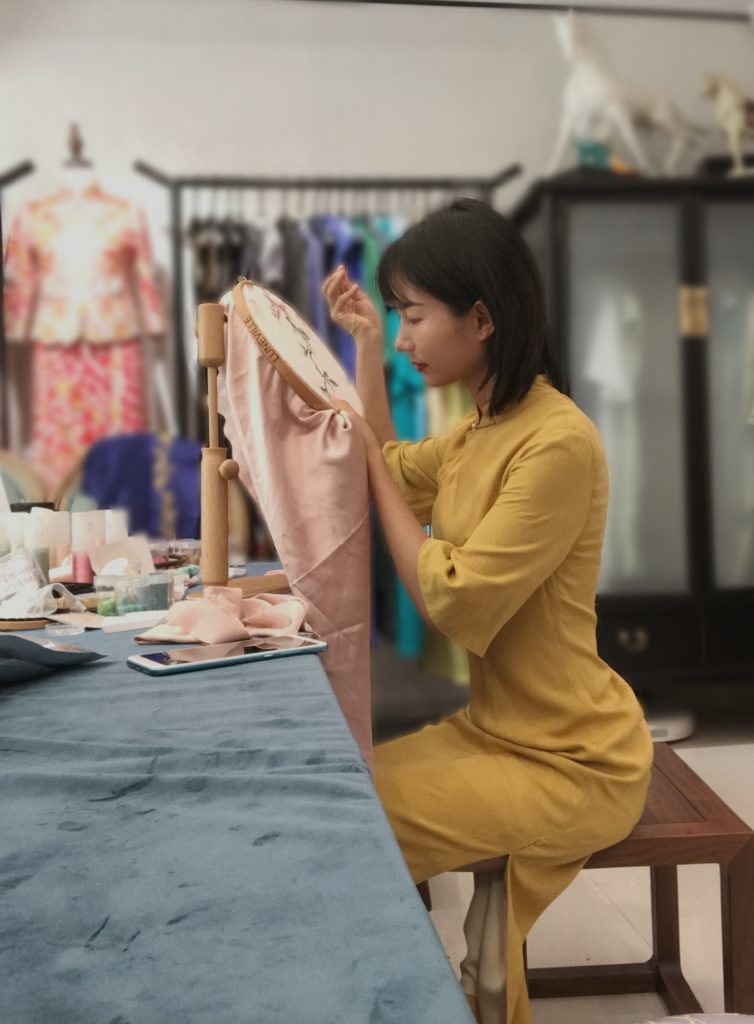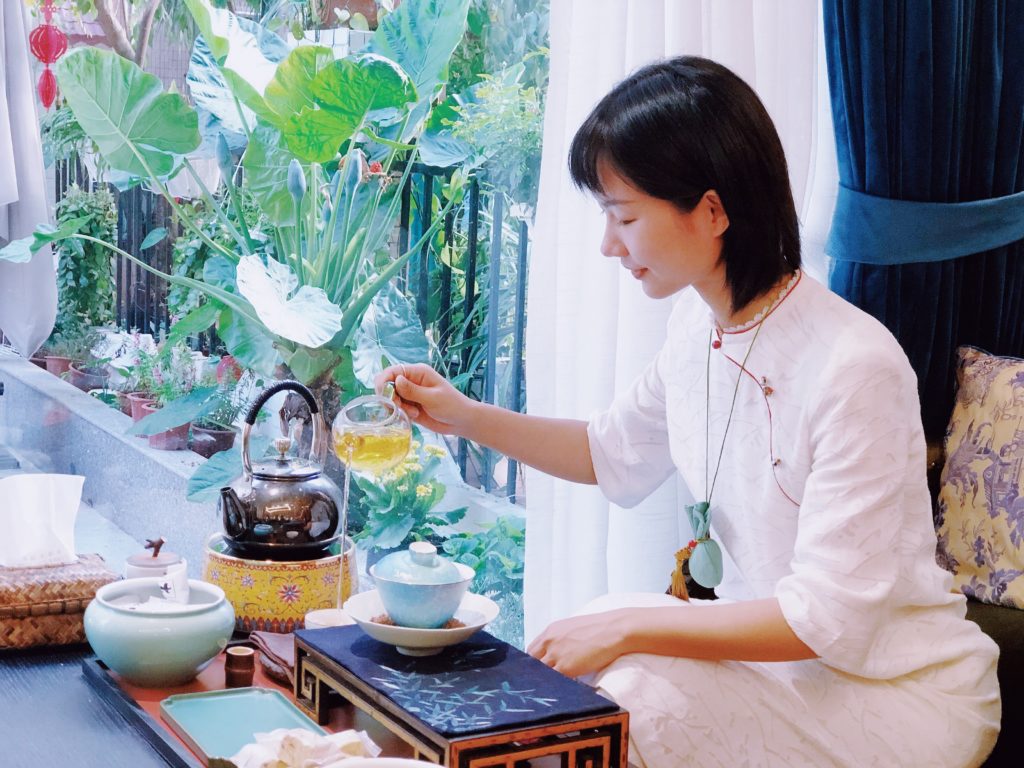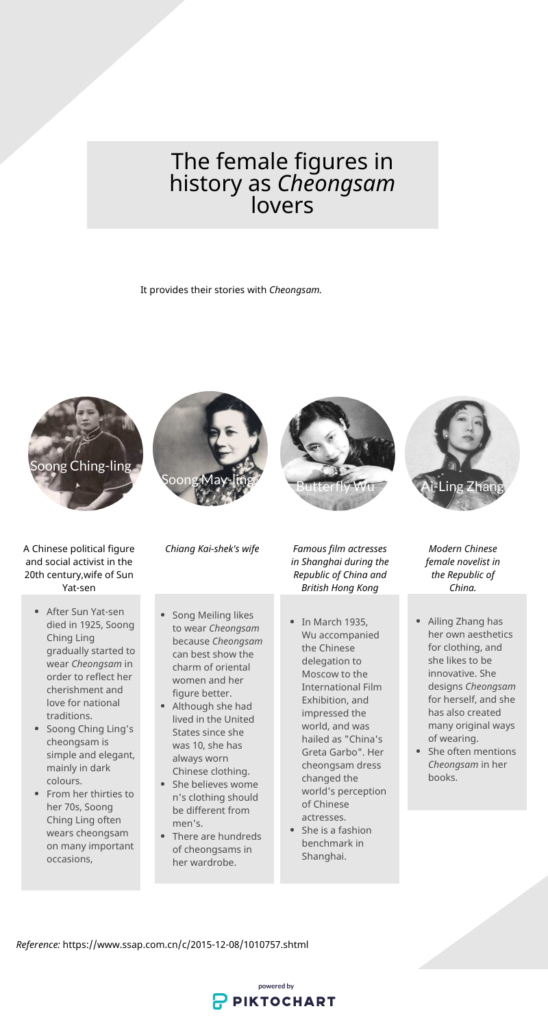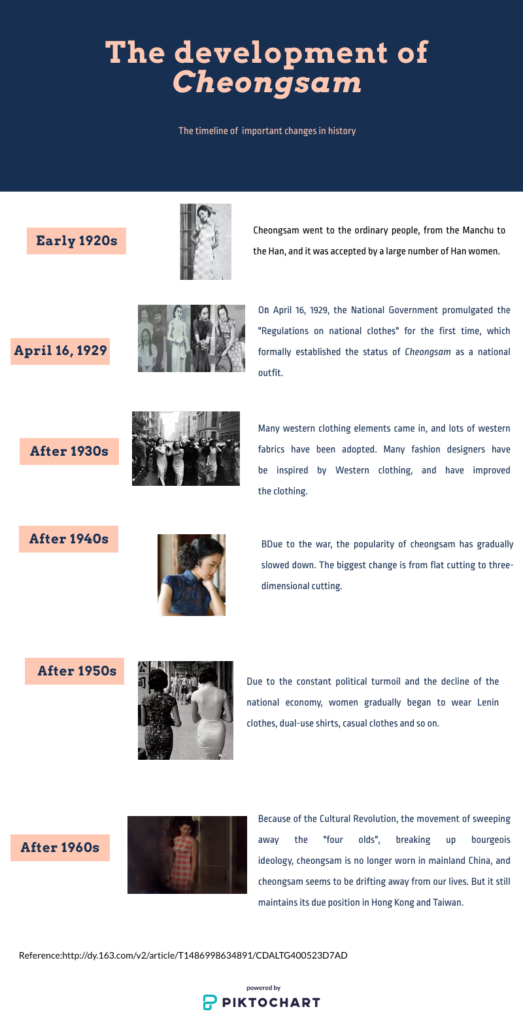A growing number of young Chinese women are wearing Cheongsam, a traditional outfit for women. What does this say about the role of women in today’s China and the past?
Several young women wearing Cheongsam are walking on the Shanghai Beach in the daytime, causing quite a stir. They are posting for photo shooting. It is common on the street and Shanghai is not the only place that could find Cheongsam fever.
“Besides middle-aged women who are the biggest buyers, a growing number of younger customers are causing something of a Cheongsam revival” according to one designer, Lai.

As an icon of Chinese fashion, Cheongsam represents the traditional women’s identity despite it has many variation in the history and influenced by western culture. Therefore, women wearing Cheongsam are tagged as traditional women. But not many of them have the sense of identity.
“Many girls are afraid of being related to traditional women when wearing Cheongsam, but I want to tell them it is a part of our culture inheritance that we should be proud of,” says Yuan, a college student who is also a Cheongsam lover. “We should not be ashamed of our history or our traditions.”
There are often different opinions about the meaning of traditional women in China but in most cases, it refers to “good wife and mother, namely housewife”
As a result, the concept of traditional women is rejected by the young generation who regard themselves as modern women. Serene is one of them who dislikes being called traditional women.
“I am certainly not a traditional women. I love to wear Cheongsam and learn traditional culture, but we need to ‘Take the essence and discard the dregs’. ” says Serene.
With the revival of Cheongsam, there is also the revival of traditional culture these years. The so-called “virtue schools” for women emerged. In 2018, according to Xinhua news, a summer camp under the guise of “promoting traditional Chinese culture” has appeared in Wenzhou, Zhejiang. It seems to be teaching Chinese culture, but in fact, it promotes “women’s virtue” as they claimed.

At that time, it was reported and became viral on the Internet, then the “virtue schools” was quickly stopped by the local government for violating social morals.
However, the “Fushun City Traditional Culture Research Association”, which organized this class, has revived and soon became active in major cities. Recently, a new “virtue schools” appeared in Qufu, Shandong where is home of Confucius.

For Lin Yinhe, traditional culture has a good side and bad side. The bad part including women’s virtue should be abandoned completely.
As a result, being traditional women can be controversial sometimes. For many young women, being traditional women is in the opposite of being independent.
These days there is a heated discussion about whether those full-time housewives, which are the representative traditional women are actually independent women.
“It is either mean or stupid to brag about being a housewife. The reason why the social status of women has greatly improved is due to women like Deng Yingchao fighting for women to have the right to a career.The education we received is not to train us to be housewives” says Feng on the social media, as a writer and a social media influencer.
This kind of statement is recognized by Wang Zheng, Professor of History and Women’s Studies, University Michigan.
She says: “It would be a reversion to history if we ask women to learn Confucianism and the family go back to the traditional mode that men work ouside while women stay at home. ,Women should not sacrifice themselves for the husband-powered patriarchal family, and be a good wife and mother, and be a good wife. It will inevitably arouse fierce conflicts between generations and genders, and a harmonious society cannot be realized through it.”
However, such views has not become the mainstream in China. Even in modern China, the stereotyped image for women from traditional Confucianism is still rooted deeply in society.
“women have no suitable work to do other than housewives in the stereotyped image, It is not suitable for women in college to study science and engineering. Women should study liberal arts, and it is even more appropriate to learn housekeeping.
The most suitable role for women has always been to assist men, a role that is tamed by the authority of men.”says Li Yinhe, the first female sociologist to study sex in China and a liberal feminist.
The stereotyped image for women comes from traditional Confucianism.Confucianism was created by Confucius in the Spring and Autumn Period and played a decisive role in the development of Chinese culture. In China’s feudal society, it formed a set of ethics that oppress women including regulations on women’s behaviour, moral cultivation and lifestyle. It also emphasizes that man is superior to woman, and a woman’s place is in the home.
In current China, there is a large proportion of young mothers staying at home. According to the 2019 White Paper on Family Gestation in China published by a community platforms for mothers and babies, the proportion of young mothers staying at home without work is rising gradually, accounting for 58.6%.
Among them, 82% of the post-1995 generation are stay-at-home mothers, who mostly live in less economically developed cities. 60% of stay-at-home moms want to focus on both family and job, but due to environmental and physical constraints, only 35 percent of them take actions and find jobs outside home. In more economically developed cities, full-time housewives make up 46.8 percent of the population.
Xi, is from a economically developed city, Shanghai and insists that women and men have different social roles to play. Born in non-traditional family, like many families in Shanghai, Xi’s father is in charge of household duties.
“Due to the stressful life in Shanghai, especially after having children, women who choose to become housewives generally think they will get more benefits staying at home than from their jobs. It has nothing to do with women’s social status.”
Xi claims that men and women should play the role they’re best at so as to promote the development of family and society and create self-value maximizely.
Regardless of the labour division within the family unit, mainstream opinion in Chinese society in line with the government view encourages women to remain within the family and become a good wife and mother.
It’s ten in the morning. The administrator of a chat group called “Women hold up half the sky” shared some photos of street slogans demanding that women should obey the three obligations and four virtues as wives. It suddenly initiated arguments among the members of the chat group.
One member Li says “The government wants to promote traditional culture influenced by patriarchal ideology and Confucian governance, calling on women to return to the family. In that way, women could give birth to a second child in order to solve the reproduction problem. It does no good for women.”
She insists that woman should not give up on their rights if they want their value to be recognized by the society. In other words, women cannot give up their job and become housewives.
In the chat group, Li and other members who are all women talk about current affairs or crimes against women, and the challenges women are facing on a daily basis. They also talk about books and films about feminism as a routine.
Interestingly, the group is named after a slogan popular in the time of Mao. At that time, women were encouraged to get involved in social work instead of depending on the family. From 1958 to 1959, the Great Leap Forward took millions of women into the workforce, meanwhile women and men received equal pay for equal work.
“If ‘traditional woman’ refers to a woman who can be a good wife and mother then women living in that period surely were not traditional women. Since then, the social status of woman has declined in comparison,” the group administrator points out.
Nowadays Mao’s achievement on promoting gender equality is still valued by many Chinese feminists. Li Yinhe says: “Large-scale gender equality movement nationwide began in the 1950s when all women participated in socially productive labour and earned an independent income. At that time, the equality of men and women was truly realized and women were truly liberated.”
Although the term “traditional woman” is a neutral word, but it is being stigmatized because it usually means “ a good wife and mother”. But not everyone agrees with this definition. Lai is one of those who sees the positive side of “tradition” and “traditional woman”.
“The traditional woman, to me, represents a kind of classic female beauty which is unique to China, a kind of quiet beauty that has been appreciated for thousands of years.” she says.
The image of women in Cheongsam can be seen a lot in the films and television works. The audience are impressed by the beauty of the clothes.
“The world will never forget the charm of Su Lizhen in the movie “In the Mood for Love”; the graceful women in the movie “The Flowers Of War”. Cheongsam plays an important role in showing their beauty.” says Manyi, professor of Lu Xun Art Institute who has studied Cheongsam for years.
The classic beauty can be found in many art works, but in ordinary life, it does not gain wide popularity. As a lover and designer of Cheongsam, Lai wants everyone to appreciate the beauty of the style. But she doesn’t agree with stereotyping women who wear Cheongsam today. “Cheongsam is really just a a piece of clothing — don’t read too much into it. Just see it as a another ordinary dress, then one day it will appear normal and everyday. And that’s what we want.”

Nana, another Cheongsam lover has been influenced by her grandmother . “Cheongsam will never go out of fashion. You can wear it all through your life. Different women can reflect the beauty of it in different ways.”
The number of women wearing Cheongsam is still small compared to those who choose more up to date fashion. And Lai believes that Cheongsam will need to adapt to modern tastes without losing its traditional flavor.
The innovation of Cheongsam has three main principles: one is to face contemporary life; the second is to grasp the characteristics of fashion; the third is to address the issues of the times.
According to Lai, “At present, the country promotes traditional culture and education, but the public is not that familiar with Cheongsam as a traditional form of dress. I hope it can be accepted more widely by the public one day.”


